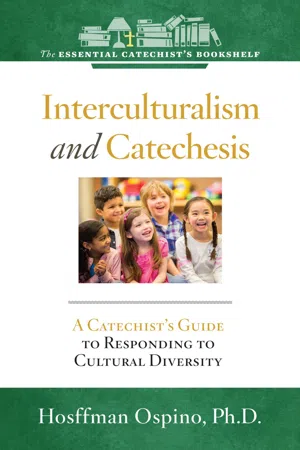
eBook - ePub
Interculturalism and Catechesis
A Catechist's Guide to Responding to the Cultural Diversity
Hosffman Ospino
This is a test
- English
- ePUB (mobile friendly)
- Available on iOS & Android
eBook - ePub
Interculturalism and Catechesis
A Catechist's Guide to Responding to the Cultural Diversity
Hosffman Ospino
Book details
Book preview
Table of contents
Citations
About This Book
This practical, hands-on guide is written to help catechists and catechetical leaders share the richness of the Catholic faith while affirming and honoring the many cultures and languages of their parishes. With tips for training catechists to be culturally-sensitive and for planning programs, lessons, and events, this invaluable resource can help you build even stronger communities of faith in a culturally diverse world.
Frequently asked questions
How do I cancel my subscription?
Can/how do I download books?
At the moment all of our mobile-responsive ePub books are available to download via the app. Most of our PDFs are also available to download and we're working on making the final remaining ones downloadable now. Learn more here.
What is the difference between the pricing plans?
Both plans give you full access to the library and all of Perlego’s features. The only differences are the price and subscription period: With the annual plan you’ll save around 30% compared to 12 months on the monthly plan.
What is Perlego?
We are an online textbook subscription service, where you can get access to an entire online library for less than the price of a single book per month. With over 1 million books across 1000+ topics, we’ve got you covered! Learn more here.
Do you support text-to-speech?
Look out for the read-aloud symbol on your next book to see if you can listen to it. The read-aloud tool reads text aloud for you, highlighting the text as it is being read. You can pause it, speed it up and slow it down. Learn more here.
Is Interculturalism and Catechesis an online PDF/ePUB?
Yes, you can access Interculturalism and Catechesis by Hosffman Ospino in PDF and/or ePUB format, as well as other popular books in Theology & Religion & Religious Education. We have over one million books available in our catalogue for you to explore.
Information

Ten Tips to Organize (or Reorganize) Catechetical Programs in Culturally Diverse Contexts

Christians have been engaged in the process of sharing the faith for two millennia. We have learned a lot in the process. From the very beginning, Christian missionaries, teachers, preachers, and catechists realized that if the message of the gospel was to touch people’s lives, the way in which that message was communicated needed to be adapted to the particular circumstances in which people lived. Catechesis must take into consideration the cultural realities that shape people’s lives, how they make meaning, and their ways of knowing reality. St. Thomas Aquinas wisely noted that “whatever is received is received according to the mode of the receiver.”
Organizing a catechetical program is a major task in itself! There are many practical aspects that need to be considered, including training catechists, selecting materials, scheduling, and reserving spaces where the catechetical experience will take place. Thinking about diversity, particularly issues of culture, language, and race/ethnicity, adds another layer of complexity to the planning process.
In culturally diverse contexts, however, catechists need to engage culture as a priority if we want to be responsible to those circumstances and experiences that shape people’s lives in the everyday. If catechesis fails to address and engage the cultural dynamics that mediate how God becomes present in the here and now of our existence, we run the risk of running initiatives that are ultimately irrelevant and disconnected from people’s everyday existence.
It is possible that you are in a faith community or a school setting where catechesis follows a model that has been in place for a long while and may have worked well in the past. Perhaps such a model was established at a time when catechetical leaders did not have to worry about different cultural and linguistic groups sharing the faith in the same space. However, if that community or school setting is experiencing an influx of culturally diverse groups, then catechesis needs to be reorganized.
The following are ten practical tips to organize (or reorganize) catechetical programs in culturally diverse contexts that catechists and catechetical leaders can implement with some level of intentionality. The tips are not cold and unengaged suggestions that call for catechists to go behind a desk to envision a master plan in their minds with the hope that it will work for everyone. On the contrary, they are rooted in the conviction that planning a catechetical initiative is a deeply relational experience.
Just as in politics, all catechesis is local! The following tips are not rigid formulas but general recommendations that aim at creating an environment for creative conversations about catechesis and cultural diversity.
As you go through these tips, my hope is that at the end you can say: “I can do that”!
1. Pray for wisdom to know what to do.
Prayer is always a good way to start the discernment about what needs to be done to organize a catechetical program. After all, it is the Holy Spirit who will guide the process, prepare and move the hearts of those who will be involved, inspire catechists, and ensure that the gifts that the baptized receive will bear fruit for the good of the entire community.
Two passages come to mind about a community of Christian disciples praying before engaging in catechesis and evangelization in the context of diversity. Both passages come from the Acts of the Apostles.
The first passage is in Acts, chapter 2. The disciples had gathered to pray and discern about what to do next after the Ascension. They most likely knew that the task of announcing the Good News to the many people living in Jerusalem would be titanic. Fear and uncertainty may have entered their hearts. On the day of Pentecost, they received the Holy Spirit: “they were all filled with the Holy Spirit and began to speak in different tongues, as the Spirit enabled them to proclaim” (Acts 2:4). With the Spirit in their hearts, they knew what to do and how to do it with a very diverse population.
Later on in the book of Acts, this time in chapter 10, Peter discerns about the idea of baptizing Cornelius, a Roman soldier, a Gentile. While in prayer, he receives assurance of God’s plans. Peter comes to the house of Cornelius and asserts, “I see that God shows no partiality. Rather, in every nation whoever fears him and acts uprightly is acceptable to him” (Acts 10:34–35). The Spirit comes upon Cornelius and those in his house; then all are baptized. This passage is a reminder of the universality of salvation. Diversity is not an obstacle to experience the richness of God’s merciful love.
When in doubt about what to do, pray. God will show the way.
2. Know well your community and the people you will meet in the catechetical experience.
It could be tempting for some catechists to assume that as long as one “stays on topic,” focused primarily on content and texts like a catechism or a catechetical guide, there is no need to get too personal or too concerned about cultural or personal realities.
However, a Catholic understanding of catechesis suggests otherwise. Catechesis is deeply personal. It intentionally engages our everyday experience, takes culture seriously, and is very concerned about how we bring our faith into practice. It could not get more personal than that.
Every person and every group has a story. Take the time to learn about the different cultural and linguistic groups in your faith community. Here are three ways to get to know more about them:
- Read a short history about each particular group. If they are immigrants or children of immigrants, learn about their history of migration. You can go to a library or search online.
- Meet two or three people from those communities, ideally of different ages, and ask them to share some stories. You can ask these five questions in a short conversation:
- Who are you? Say a little about what you do.
- Can you share something about the place where you grew up?
- What do you appreciate most about the cultural/ethnic/linguistic community to which you belong?
- What is one of the religious traditions you like most in your community?
- In what ways do you feel that you belong to this parish (or school or group)?
- If these communities celebrate the Eucharist in a language different from yours, or perhaps another liturgical moment or ritual, make the time to attend. Observe…listen…contemplate…allow yourself to be drawn into the experience.
Take some notes, and discuss them with your fellow catechists, friends, and family.
3. Listen carefully to different voices.
Take advantage of the wisdom about sharing faith that already exists in each of the cultural groups in your community. Inquire about how parents in various cultural groups pass on the faith to their children. Ask about how families pray at home. Identify if parents and relatives have any struggles accompanying the young in the process of sharing the faith.
Very often, catechetical and pastoral leaders plan entire catechetical programs based on their experience, instinct, or professional expertise, practically without consulting those groups in the community that will be most impacted by their decisions. Often, groups that fall under the narrow categories of “minorities” or “cultural” are left out of processes of consultation.
Pastors, catechetical leaders, and school administrators frequently make executive decisions about catechetical materials without having a conversation about how such materials incorporate the experience of the various cultural groups in a community. Allegiance to a publisher may not be enough when selecting materials for bilingual catechesis or faith formation initiatives that form people to live and practice their faith in a diverse church and society.
At the level of logistics, inquire about the best times to hold catechetical meetings. Many communities assume that weekends and evenings are among the best timeframes to do that. Yet, in communities with large number of immigrants, the timeframes for meetings may be different. Multicultural communities in urban and busy settings may not have the flexibility of the suburban context.
One common concern in multilingual communities is the language of catechesis. Opinions about this vary from community to community. Some catechists insist on a “one-language-only” approach for catechesis. Some immigrants want to use catechesis as a moment to teach and cultivate language and cultural traditions. Some communities have catechesis in two, three, or even more languages. In catechetical programs for children and youth whose pa...
Table of contents
- INTRODUCTION
- Yes, Friends, Cultural Diversity Is Real
- A Few Thoughts on Culture
- For Our Own Catholic Wells
- God’s Way
- Intercultural Competencies for Catechists
- Dos and Don’ts about Culture
- Ten Tips to Organize (or Reorganize) Catechetical Programs in Culturally Diverse Contexts
Citation styles for Interculturalism and Catechesis
APA 6 Citation
Ospino, H. (2019). Interculturalism and Catechesis (1st ed.). Twenty-Third Publications/Bayard. Retrieved from https://www.perlego.com/book/2892774/interculturalism-and-catechesis-a-catechists-guide-to-responding-to-the-cultural-diversity-pdf (Original work published 2019)
Chicago Citation
Ospino, Hosffman. (2019) 2019. Interculturalism and Catechesis. 1st ed. Twenty-Third Publications/Bayard. https://www.perlego.com/book/2892774/interculturalism-and-catechesis-a-catechists-guide-to-responding-to-the-cultural-diversity-pdf.
Harvard Citation
Ospino, H. (2019) Interculturalism and Catechesis. 1st edn. Twenty-Third Publications/Bayard. Available at: https://www.perlego.com/book/2892774/interculturalism-and-catechesis-a-catechists-guide-to-responding-to-the-cultural-diversity-pdf (Accessed: 15 October 2022).
MLA 7 Citation
Ospino, Hosffman. Interculturalism and Catechesis. 1st ed. Twenty-Third Publications/Bayard, 2019. Web. 15 Oct. 2022.